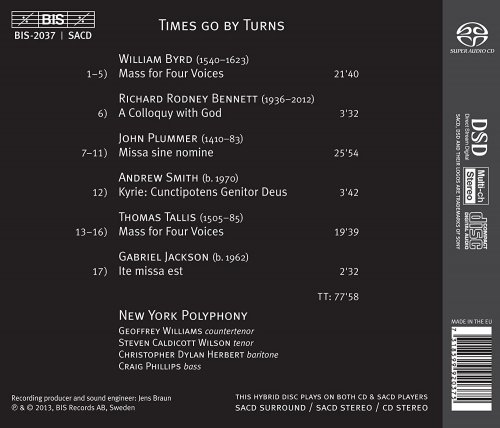
New York Polyphony - Times Go by Turns (2013)
BAND/ARTIST: New York Polyphony
- Title: Times Go by Turns
- Year Of Release: 2013
- Label: BIS
- Genre: Classical
- Quality: flac lossless (tracks) +Booklet
- Total Time: 01:17:58
- Total Size: 360 mb
- WebSite: Album Preview
Tracklist
01. Mass a 4: I. Kyrie eleison
02. Mass a 4: II. Gloria
03. Mass a 4: III. Credo in unum Deum
04. Mass a 4: IV. Sanctus-Benedictus
05. Mass a 4: V. Agnus Dei
06. A Collloquy with God
07. Missa sine nomine: I. Kyrie omnipotens Pater
08. Missa sine nomine: II. Gloria in excelsis Deo
09. Missa sine nomine: III. Credo in unum Deum
10. Missa sine nomine: IV. Sanctus-Benedictus
11. Missa sine nomine: V. Agnus Dei
12. Kyrie IV: Cunctipotens genitor Deus
13. Mass for 4 Voices: I. Gloria in excelsis Deo
14. Mass for 4 Voices: II. Credo in unum Deum
15. Mass for 4 Voices: III. Sanctus-Benedictus
16. Mass for 4 Voices: V. Agnus Dei
17. Ite miss est

The title of this release by the male quartet New York Polyphony refers to a poem by the martyred Catholic poet Robert Southwell, reproduced in the CD packaging. The idea of performing these works with a vocal quartet, which is certainly not how they were originally performed, appears to be that the pieces involved have an inward, secret quality resulting from the persecution of Catholics in England. Reactions to the album as a whole will likely to depend on how listeners feel about hearing Renaissance choral works sung by a quartet, and in parts of the album the medium undoubtedly contributes to the message. There's a lot to be said for hearing Byrd's Mass for four voices performed this way, for the way Byrd uses polyphony to sculpt out the words of the Catholic mass comes through with unusual clarity here. The same is true to a lesser extent of Thomas Tallis' Mass for four voices. From there the logic of the program breaks down; the Missa sine nomine of the little known early Renaissance composer John Plummer shares the gently lyrical but still essentially impersonal language of John Dunstable, and the three contemporary pieces are of a different emotional flavor. Of the sheer sensuous beauty of New York Polyphony's singing there can be little question, and the group is given a luxuriant environment in which to flourish by the BIS engineering team, working in Sweden's small, stark Länna church from the Gothic era. The question is whether the sound matches the music. Sample a bit: the music may grab you instantly, or you may find it strangely mannered.
01. Mass a 4: I. Kyrie eleison
02. Mass a 4: II. Gloria
03. Mass a 4: III. Credo in unum Deum
04. Mass a 4: IV. Sanctus-Benedictus
05. Mass a 4: V. Agnus Dei
06. A Collloquy with God
07. Missa sine nomine: I. Kyrie omnipotens Pater
08. Missa sine nomine: II. Gloria in excelsis Deo
09. Missa sine nomine: III. Credo in unum Deum
10. Missa sine nomine: IV. Sanctus-Benedictus
11. Missa sine nomine: V. Agnus Dei
12. Kyrie IV: Cunctipotens genitor Deus
13. Mass for 4 Voices: I. Gloria in excelsis Deo
14. Mass for 4 Voices: II. Credo in unum Deum
15. Mass for 4 Voices: III. Sanctus-Benedictus
16. Mass for 4 Voices: V. Agnus Dei
17. Ite miss est

The title of this release by the male quartet New York Polyphony refers to a poem by the martyred Catholic poet Robert Southwell, reproduced in the CD packaging. The idea of performing these works with a vocal quartet, which is certainly not how they were originally performed, appears to be that the pieces involved have an inward, secret quality resulting from the persecution of Catholics in England. Reactions to the album as a whole will likely to depend on how listeners feel about hearing Renaissance choral works sung by a quartet, and in parts of the album the medium undoubtedly contributes to the message. There's a lot to be said for hearing Byrd's Mass for four voices performed this way, for the way Byrd uses polyphony to sculpt out the words of the Catholic mass comes through with unusual clarity here. The same is true to a lesser extent of Thomas Tallis' Mass for four voices. From there the logic of the program breaks down; the Missa sine nomine of the little known early Renaissance composer John Plummer shares the gently lyrical but still essentially impersonal language of John Dunstable, and the three contemporary pieces are of a different emotional flavor. Of the sheer sensuous beauty of New York Polyphony's singing there can be little question, and the group is given a luxuriant environment in which to flourish by the BIS engineering team, working in Sweden's small, stark Länna church from the Gothic era. The question is whether the sound matches the music. Sample a bit: the music may grab you instantly, or you may find it strangely mannered.
As a ISRA.CLOUD's PREMIUM member you will have the following benefits:
- Unlimited high speed downloads
- Download directly without waiting time
- Unlimited parallel downloads
- Support for download accelerators
- No advertising
- Resume broken downloads


